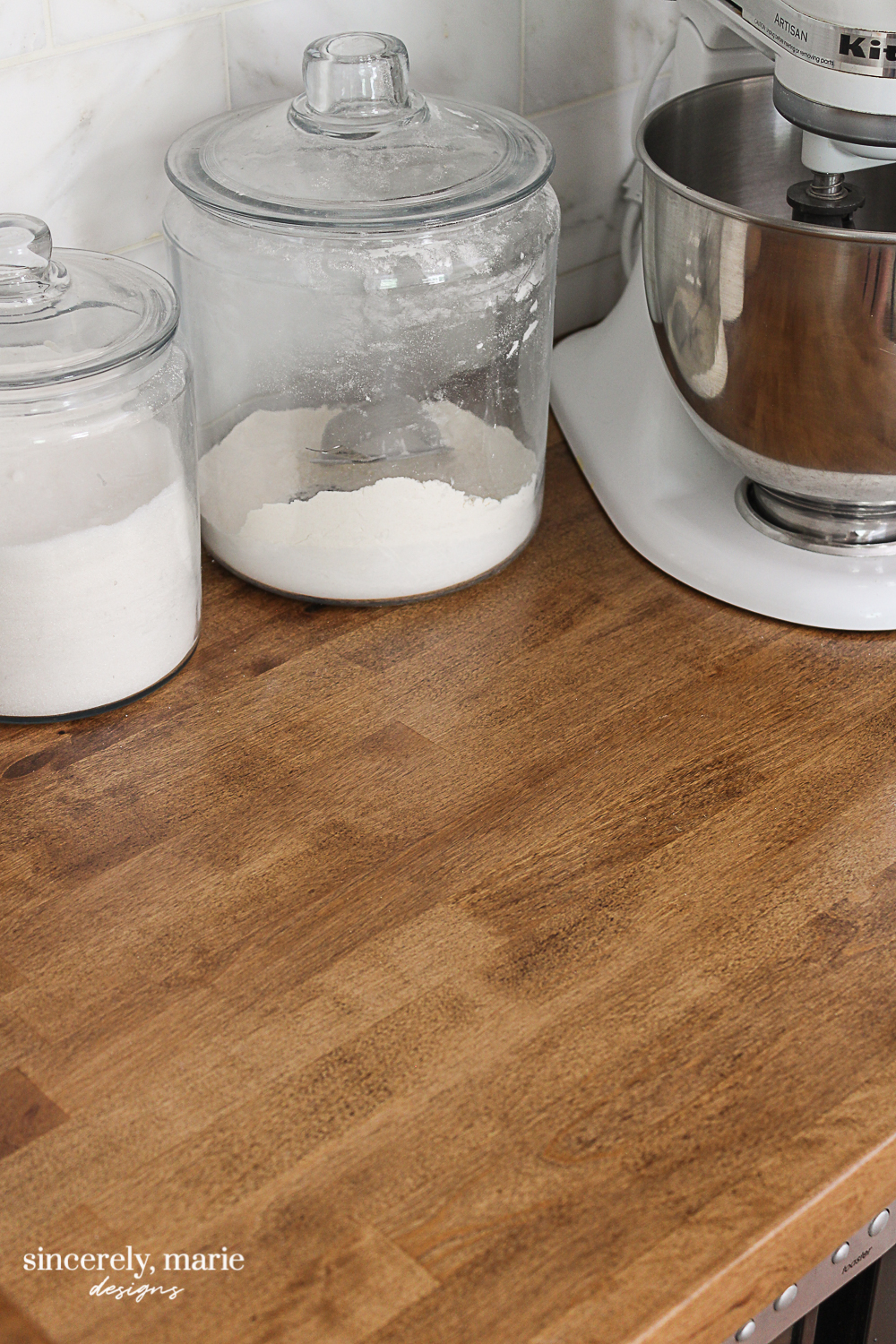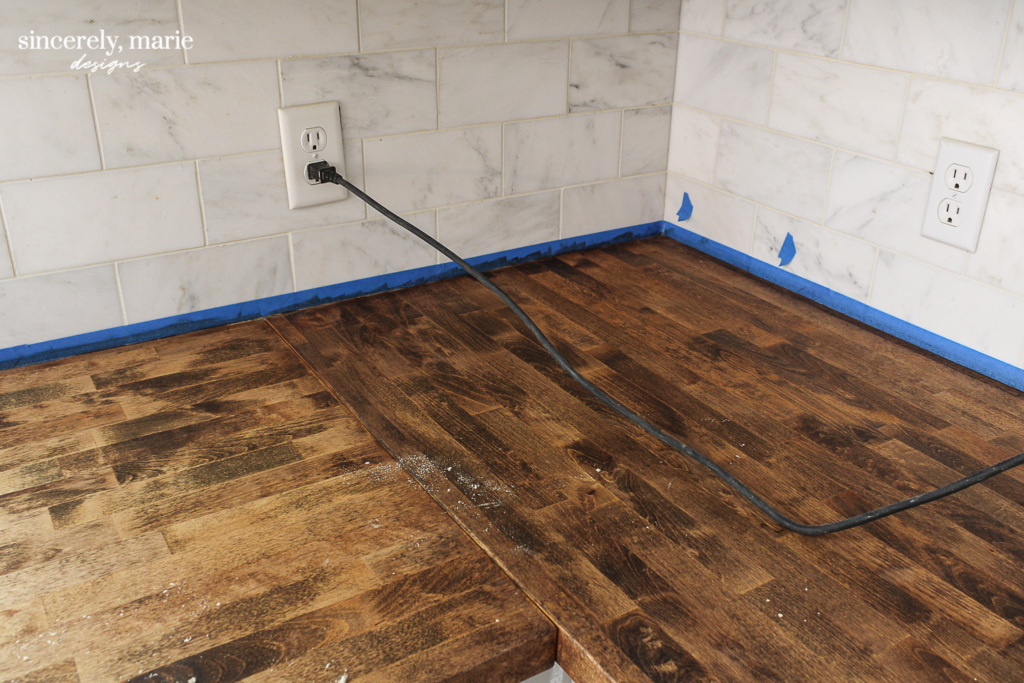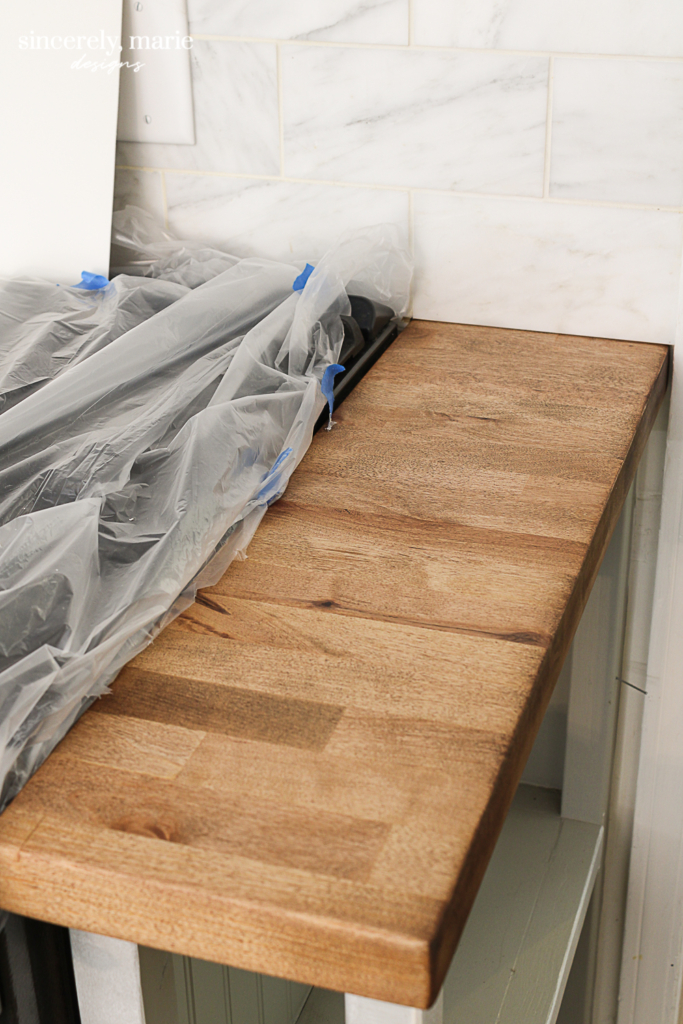Restoring butcher block countertops can breathe new life into these classic kitchen surfaces, bringing back their natural warmth and beauty. Over time, butcher block countertops can show signs of wear, including scratches, stains, and a dull appearance. However, with the right tools, materials, and techniques, it is possible to restore them to their former glory.
The first step in restoring butcher block countertops is to assess the extent of the damage. If the surface has deep scratches or gouges, it may be necessary to sand the countertop to remove these imperfections. Start with a coarse-grit sandpaper and gradually progress to finer grits for a smooth finish. Sanding not only removes scratches but also reveals a fresh layer of wood.
Once the sanding is complete, thoroughly clean the countertop to remove any dust or debris. A mixture of mild soap and water works well for this purpose. Allow the countertop to dry completely before moving on to the next step.
To enhance the natural beauty of the wood and protect it from future damage, applying a food-grade mineral oil or a specialized butcher block oil is essential. The oil nourishes the wood, preventing it from drying out, and helps to repel moisture. Beeswax can also be added to the oil for an extra layer of protection and a subtle sheen.
For those looking to add a richer color to the butcher block, using tinted mineral oil or a combination of mineral oil and an FDA-approved wood stain can be an option. This step allows for personalization of the countertop’s appearance while maintaining its functionality.

For butcher block countertops near sinks or areas prone to water exposure, sealing the wood with a food-grade mineral oil and beeswax mixture can provide an additional barrier against moisture. This mixture forms a protective layer that prevents water from penetrating the wood, reducing the risk of warping or damage.
Regular maintenance is key to keeping restored butcher block countertops in optimal condition. Periodic reapplication of mineral oil, especially in areas that undergo heavy use, helps to maintain the wood’s moisture balance and prevent drying or cracking. This maintenance routine ensures that the countertop remains both beautiful and functional over time.
Removing stains from butcher block countertops may require more targeted efforts. For water stains, a mixture of baking soda and water can be applied to the affected area, left to sit for a few minutes, and then gently scrubbed away. For stubborn stains like red wine or fruit juice, a mixture of hydrogen peroxide and baking soda can be applied, followed by a thorough rinse.

If the butcher block has developed an unpleasant odor due to food or spills, applying a mixture of lemon and salt can help neutralize the odor. The acidity of the lemon helps eliminate odors, and salt acts as a gentle abrasive for cleaning.
In cases where the butcher block has developed mold or mildew, a mixture of white vinegar and water can be an effective natural solution. Spray the affected area with the vinegar solution, allow it to sit for a while, and then scrub away the mold or mildew. Proper ventilation is crucial during this process.
When it comes to maintaining the beauty of restored butcher block countertops, using cutting boards and trivets is highly recommended. These protective measures prevent direct contact with hot cookware or sharp utensils, minimizing the risk of scratches, burns, or other damage to the wood surface.
If the restored butcher block countertops have visible scratches or gouges, filling these imperfections with wood filler can help achieve a smoother appearance. Choose a filler that matches the color of the wood, apply it according to the manufacturer’s instructions, and sand the area until it blends seamlessly with the rest of the countertop.
For those who prefer a satin or glossy finish on their butcher block countertops, a food-safe polyurethane sealer can be applied after the oiling process. This sealer provides an additional layer of protection and gives the countertop a subtle sheen. However, it’s important to note that polyurethane may require more maintenance, as it can be susceptible to scratches.
In cases where the restored butcher block countertops have sustained significant damage or wear, consulting with a professional woodworker or refinishing expert may be advisable. They can guide the best course of action, whether it involves more extensive repairs, re-sanding, or even replacement.
Restoring butcher block countertops involves a systematic approach that includes sanding, cleaning, oiling, and, if needed, addressing specific issues like stains or scratches. Regular maintenance and protective measures, such as using cutting boards and trivets, can help preserve the beauty and functionality of the restored countertops over time. By following these steps and incorporating personalized touches, homeowners can enjoy the enduring charm of butcher block countertops in their kitchens.
How We Refinished our Butcher block Countertop

In the face of new competitors, Butcher block countertops stay popular for good reasons that are many . For one element, they’re generally less expensive compared to granite or some other popular materials which are commonly used in kitchen remodels today. Stainless steel kitchen area counters are an additional chic choice.
How To Refinish Butcher Block Countertops – Sincerely, Marie Designs

How We Refinished our Butcher block Countertop – Chris Loves Julia

How To Refinish Butcher Block Countertops – Sincerely, Marie Designs

How To Refinish Butcher Block Countertops – Sincerely, Marie Designs

How to repair butcher block counter top McClure Block Part 2

How to Care for Butcher Block Countertops Butcher block

Related articles:
- Island Butcher Block Countertops
- How To Care For Butcher Block Countertops
- DIY Butcher Block Countertops
- Farmhouse Butcher Block Countertops
- Kitchen Designs With Butcher Block Countertops
- Sanding Butcher Block Countertops
- Butcher Block Countertops With White Cabinets
- Build Your Own Butcher Block Countertop
- Butcher Block Countertop With Tile Backsplash
- How To Stain Butcher Block Countertops